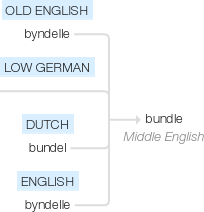Bundle
Middle English: perhaps originally from Old English byndelle ‘a binding’, reinforced by Low German and Dutch bundel (to which byndelle is related).
wiktionary
From Middle English bundel, from Middle Dutch bondel or Old English byndele, byndelle(“a binding; tying; fastening with bands”); both from Proto-Germanic *bundil-, derivative of *bundą(“bundle”). Compare also English bindle.
etymonline
bundle (n.)
early 14c., "bound collection of things," from Middle Dutch bondel, diminutive of bond, from binden "to bind," or perhaps a merger of this word and Old English byndele "binding," from Proto-Germanic *bund- (source also of German bündel "to bundle"), from PIE root *bhendh- "to bind." Meaning "a lot of money" is from 1899. To be a bundle of nerves "very anxious" is from 1938.
bundle (v.)
1620s, "to make into a bundle," from bundle (n.). Meaning "to sleep with another, clothed, in the same bed," a noted former custom in New England, is from 1781. Meaning "to send away hurriedly" is from 1823, from the notion of packing one's effects for a journey. To bundle up "wrap in warm heavy clothes" is from 1853. Related: Bundled; bundling.
